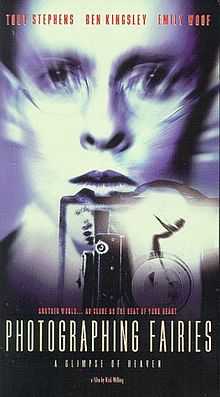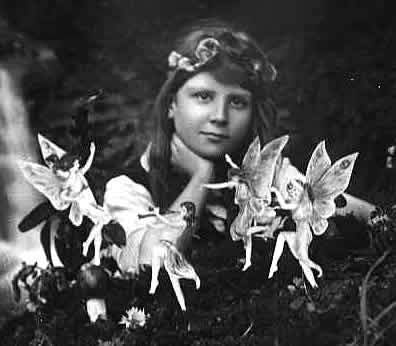Seekers after Truth and a Taste of Heaven:
Photographing Fairies
Let me say right at the outset that this film is one of those overlooked gems; and certainly is amongst the most provocative, complex and downright baffling examinations of whether or not there is a life beyond this one. And whether you believe in an afterlife or, like me, just don’t have a clue, it is worth seeing just as a major work of Art.
Dear oh dear, there you go: I’ve gone and said it, the A word. But please do not let that put you off. If you don’t find yourself riveted to this simply as a great cinematic experience then you’ve been watching ‘way too many National Lampoon movies.
Photographing Fairies takes as its starting point the much told tale of Sir Arthur Conan Doyle and the Cottingley Fairies. Despite the fact that the two girls involved in that piece of not-very-convincing fakery later admitted that they made the whole thing up, it seems to have a power to still intrigue the gullible.
Here we have Toby James as the photographer Charles Castle, a man who has lost his wife during their honeymoon and has, as a consequence, given up on life except as something to be joylessly lived through. He cares for nothing except his profession and is embittered to a dreadful degree. He spends his spare time debunking (much in the manner of Houdini) spiritualists, Theosophists and yes, people like Conan Doyle (Edwarde Hardwicke), the creator of that most logical of men, Sherlock Holmes, who somehow still found himself believing in all kinds of nonsense.
It is at one of these meetings, however, that he comes into contact with Beatrice Templeton (Francis Barber), who believes that she has incontrovertible proof that a different phase of existence is real. Very, very much against his common sense he comes to think that she just might be right; and, jeopardising his career, he travels to see her and her daughters, who seem to have an actual physical link with fairies—anatomically correct, nude little creatures that appear to them when they go through a sort of warped religious ceremony in front of a giant tree. They have taken from this tree and eaten certain flowers, which enhance their perceptions. Are we clear so far?
Well, I suppose it sounds a bit barmy all right; but surely no crazier than thinking that when you eat a bit of unleavened bread you are in touch with Jesus. And there are a lot of people out there that think that. In fact, probably the same ones who would laugh at the concept of this movie, or who would listen to the New Year ramblings of a mad old pope who thinks that gay marriage singles the end of us as human beings.
Hiding behind Faith
Photographing Fairies is, amongst many other things, a deeply affecting study of a man who has reached a watershed and now wants to go on further in his explorations. He has entered a world that seems pantheistic in nature (bad pun!) but which, with a little common sense, should be able to co-exist with that of Christian beliefs without a great deal of trouble. Unfortunately for Castle that side of things is represented by Beatrice’s husband, the Reverend Templeton. From almost his initial appearance the vicar, played with gleeful gusto by Ben Kingsley, establishes himself as an enormously physical presence, laughing in a nearly demented manner as he scoffs down, rather ironically, angel cakes baked by an adoring parishioner. He is a perfect church leader for this rural, post-Great War community. He sprinkles in with a genuinely charismatic approach to sermons such observations as: “God helps those who get up off their arses.” And that’s something that his earthy flock definitely agree with. It doesn’t make him a man capable of attempting to understand the obsessions of his wife and daughters, however; and the scene in which he single-mindedly and venomously destroys the photographic equipment with which Castle has hoped to capture other-world images is a stunning and almost frightening example of Pagan and Christian colliding in mutual destruction.
Due to my own considerable prejudices I saw this as the barbarian Christian destroying something that he doesn’t understand and which undermines his beliefs. But maybe that’s just me.
Toby Stephens is impressive as the awakened atheist who is unable to let things go. The children’s nanny Linda (Emily Woof), who has a romantic interest in him, points out: “The past is over. It’s time to stop looking at the shadows, see what’s right in front of you.” Here, though, I could relate completely to Charles Castle: he knows that the past is never over, no matter how much we might wish it to be so.
Nick Willing directs this 1997 film from his own script, co-written by Chris Harrald and it is based on the book (quite substantially different, if a I recall correctly) by Steve Szilagyi; and I really have to give a special mention to the beautiful cinematography of John deBorman. It is quite exceptional and raises the film to another level altogether, as does the score by Simon Boswell.
I must say though that the highlight for me is in the film’s climax which makes really powerful use of the second movement of Beethoven’s Seventh Symphony and which can be heard below.
And a final thought: it may be that what Castle and the Templeton family experience isn’t ‘real’ at all. Perhaps the flowers are just, after all, hallucinogens. That is for the viewer to decide; and again that will depend on what that viewer brings along of their own beliefs. After all, as Castle tells Templeton:
“Faith is what a man can live by; but sometimes it is what he hides behind.”
I have always found this piece by Beethoven almost unbearably moving and I hope that you like it. As an aside, if like me you enjoy classical music without having any great understanding of it, can I recommend you check out and listen to Dublin radio presenter Bernard Clarke? He is with RTE Lyric FM. He is immensely knowledgeable but never talks down to the listener; and his obvious love of music is completely infectious.



January 6, 2013
While the film almost certainly has a religious undercurrent running through it, no matter what your beliefs or non beliefs you’d want to be a cynic of all cynics not to take some enjoyment from this movie.
I’m not sure what the budget was for this film, pretty miniscule I’m sure?, goes to show you don’t need a huge budget and star names to make a good movie, but you do it seems for your movie to get a wider recognition, a hidden gem!.
Charley just one little thing, while your review is pretty much spot on you failed to mention the splatterings of mostly deadpan delivered comedy that lighten the proceedings from time to time.
Oh and Charley was jogging popular back at the turn of the century?.
January 6, 2013
Was jogging popular at the turn of the century? Good question and I’ve no idea. I don’t even have any idea why it’s popular today. Maybe a rise in masochistic tendencies; or on the other hand a sadistic urge to annoy people who are trying to walk on the pavement. Find a park!
Wait a minute, weren’t they all jogging around in slow motion in that period movie ‘Chariots of Fire’? Or was that sprinting? I can’t remember, I think I was asleep.
Thanks for mentioning the deadpan humour, Patrick (well put). I should have brought that in but I want to keep these reviews to a certain length, although I’m willing to be dissuaded on that one. With something like “Photographing…” I could write all day. I just think that there is so much in it and more than one way to interpret it.
For example, did you think that there was a certain symbolism to the names and…drone, drone, drone…
See what I mean? I’ve been thrown out of my local for less!